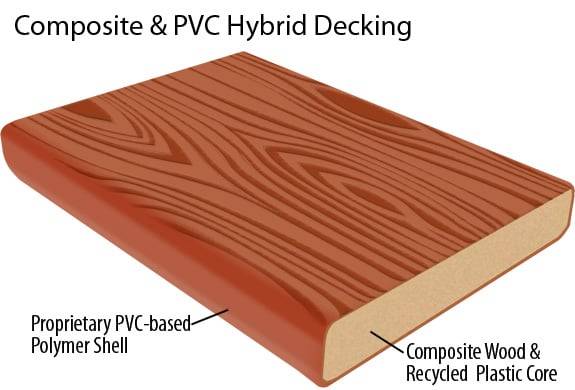
You might have heard about the latest type of composite decking. There are multiple decking brands using what’s known in the plastic industry as “capstock.”
What is Capstock decking? Basically, Capstock is a new kind of composite decking material that combines composites (plastic and wood fiber core) with a “durable” exterior layer of vinyl (PVC). Think of it as a composite and PVC deck hybrid.
Like with most new products in the decking market, the companies that sell this kind of synthetic decking are doing their best by spending millions of dollars to convince you that, FINALLY, this is a composite wood product you can trust. These brands are also trying their best to convince you and deck builders across the country that it is “as good as, or better” than natural hardwood decking in terms of durability and looks.
They even offer a 25-year warranty on their product. However, if you’ve done research, you will learn that, for many, composite decking warranties aren’t worth the paper they’re printed on. Many people complain and have sued these artificial decking companies for not complying with the terms of their warranties.
Ironically, even a reputable publication like Professional Deck Builder says about the latest trend in capstock composite decking, “The lengthy warranties – most up to 25 years – indicate that manufacturers stand behind these products (though perhaps you’ve heard that before).” That’s a direct quote, folks. Even the home-building press is skeptical about these products and for good reason.
Another interesting fact that arose out of our research is the resistance of all composite decking companies to disclose the chemical makeup of their new decking materials. In fact, when FineHomebuilding Magazine was conducting their own research into these products for their article entitled “In Pursuit of the Perfect Plank” the author noted, “None of the manufacturers I spoke with would reveal what was in their proprietary polymer.” Why is that?
One thing we do know is that, as previously mentioned, these new hybrid composite decking options are using PVC (Polyvinyl chloride). According to a report by the Healthy Building Network, “PVC is the worst plastic from an environmental health perspective, posing major hazards in its manufacture, product life and disposal.” It makes sense that these companies refuse to disclose the chemicals in this kind of decking.
It’s like they’re telling you, “Trust us. It’s better you don’t know. Just sit back, relax and spend your hard earned money on our latest concoction.”
Also, while they say that this new kind of decking is mold-resistant, let’s not forget that the primary way many decks are built is with top-down screw installation. Water does and always will seep into any crevice, no matter how small. And, over time, as that water seeps into the decking, it’s safe to assume that the soft wood fibers within the deck board itself will soak up that material and start to produce mold. Since some of these brands only cover the top and sides of the decking with the PVC-based polymer shell, the underside of those boards could very well start to rot from below.
Think about it…Your decking might look fine from the top. You’ll walk on it. Kids might play and run across the decking. But, the bottom of the decking is starting to degrade? I’d imagine you’d have a hard time calling that kind of decking maintenance free, or safe. What exactly are you paying for?
Speaking of money…
Currently, you can buy this kind of decking for between $6 – 7 a lineal foot. That’s pretty expensive for an unproven product that fuses two already suspect materials.
Does it make sense to take a chance and hope that a warranty will cover the problems that might also arise out of this hybrid decking?
Obviously, we’re a hardwood decking company. We’ve worked hard to bring high-quality, reliable decking materials to our customers for close to 20 years. We know that both families who are saving to build a deck, or homeowners looking to remodel on a whim want the same thing. A beautiful, reliable, outdoor retreat that they can enjoy, and not have to fuss, or worry over. When all is said and done it’s important to realize two things:
- When you buy hardwood decking you’re paying for a proven product.
- When you pay for these new, hybrid product, you’re paying for their marketing budget.
What choice makes sense to you?
Update: Composite decking has changed a lot over the years, and manufacturers are constantly improving the product. Many of the problems that plagued synthetic decking in the past have been solved. But not all companies and products are equal; always do your research, and only buy composite decking from reputable brands!